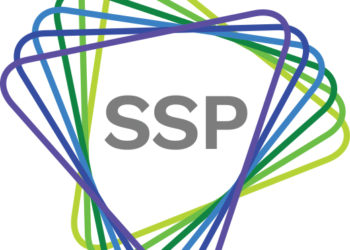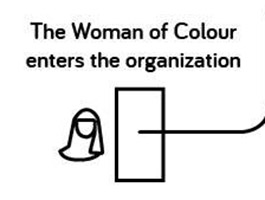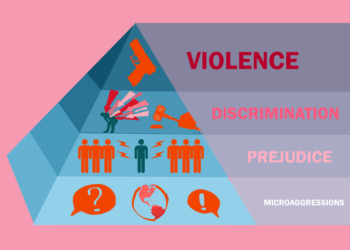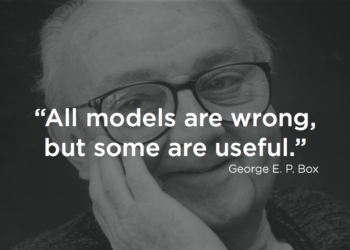Editor’s Note: Today’s post is by Niccole Coggins, Jocelyn Dawson, Melanie Dolechek, and Gisela Fosado.
When the Scholarly Kitchen posted “On Being Excluded: Testimonies by People of Color in Scholarly Publishing” (part I and part II) in April 2018, the posts quickly became some of the Kitchen’s most-read and most-shared content. The anonymous individuals who shared their stories made it clear that within the scholarly publishing industry, racism is pervasive, that Black, Indigenous, and People of Color experience real harm, and that the need for change is urgent. These testimonies, as well as surveys showing that our industry is overwhelmingly white, were front of mind when we identified the need for antiracism resources specific to scholarly publishing and submitted a proposal to the 2019 Triangle Scholarly Communications Institute (TSCI).
The Antiracism Toolkit for Allies, now available on the website of the Coalition for Diversity and Inclusion in Scholarly Communication, is the first of three planned toolkits incubated at TSCI that will provide a common framework, shared vocabulary, and best practices to address racial disparities specific to scholarly publishing. Developed with the involvement of more than 50 individuals across races and organizations, the toolkits are designed to accelerate progress toward a more equitable and inclusive workplace culture.

Drawing on the structure and framework of the American Alliance of Museums’ guides for transgender inclusion, we, as the project organizers, identified a need for three toolkits:
- The Antiracism Toolkit for Allies promotes awareness and understanding of white advantage as well as information about how to disrupt racism and create workplace communities where everyone thrives. The toolkit includes a chronology of white supremacy in the United States, sample equity and inclusion programming, a sample list of affinity and inclusivity groups, and a list of recommended racial equity training organizations.
- The Antiracism Toolkit for Black, Indigenous, and People of Color (forthcoming) will provide advice on safely navigating predominantly white spaces that may feel exclusionary, building mentorship relationships, expanding career paths, advocating for change, and self-care.
- The Antiracism Toolkit for Organizations (forthcoming) will provide tools for understanding institutionalized racism, broadening hiring and recruiting, working to correct bias, including historically marginalized perspectives in decision making, and creating affinity groups and mentorship programs.
We believe that concrete actions towards equity in our industry have the potential to be transformative not just in our workplaces but for the worldwide research community. Our publishing programs shape understanding and debate about public policy, history, science, medicine, and critical race theory in all areas of scholarship across the academic and public arenas. Yet, most scholarly publishing companies are composed of workforces that do not reflect the public we engage and educate.
To ensure that scholarly publications reach their widest possible audience and provide scholars a path to publication unimpeded by bias, it is essential that our industry address the systemic role that racism plays in shaping our workplaces. The fallout from our industry’s lack of diversity includes racial bias in citation impact, workplace microaggressions, racially insensitive and offensive business strategies, and racial and ethnic disparities in research studies. Collectively and individually, these experiences impede our missions as scholarly publishers.
How do we bring an antiracism framework to scholarly publishing?
An organizational commitment to “diversity” is insufficient in a society that has institutionalized race, racism, and white supremacy. In order to disrupt the cycle of white supremacy in our workplaces, we have to be actively antiracist, working to decenter whiteness and normalize the perspectives and experiences of BIPOC (Black, Indigenous, and People of Color) staff. This work needs to happen at the individual/interpersonal, organizational, and societal levels.
Intentional change to workplace culture is essential to attracting and retaining BIPOC staff. Too often, marginalized groups experience the burden of “bringing the diversity” to an organization that fails to consider what will make spaces feel welcoming and safe to BIPOC employees. Will they be the only BIPOC employee in most meetings? Can staff — but especially marginalized staff — be their true, authentic, and wholly embodied selves? Are there common linguistic and cultural frameworks that enable microaggressions to be identified and addressed directly? Do BIPOC staff have access to mentors and safe, affirming spaces? Do BIPOC staff have professional development opportunities? If work is not done to create an equitable working environment where BIPOC staff can thrive, the effort put into pipeline programs and recruiting efforts will be fruitless, replaced by challenges with retention and a staff make-up that continues to be overwhelmingly white.
How do we begin this work?
For leadership at publishing organizations, the work begins by listening to, believing, and supporting staff members when they push for equity and inclusion. By engaging with the survey data and testimonies mentioned above and by proactively addressing workplace inequities with trainings for all staff, mentorship programs, equity and inclusion groups, affinity groups, expansive posting of job listings, and the replacement of cultures of perfectionism with cultures of appreciation, you lay the groundwork for a more inclusive environment for all staff. Equity and inclusion efforts need an institutional partner; to address what are deeply rooted systemic inequities, forward momentum requires time and budgetary resources. And this investment pays dividends: staff feel supported, turnover of BIPOC staff declines, and the equity lens carries over into the larger scholarly ecosystem of which we are a part.
Those of us who are Black, Indigenous, and People of Color working in publishing may have had the experience of being the only BIPOC in meetings, in departments, and even in entire publishing organizations. Changing workplace culture is exhausting and time-consuming work that no one person can do on their own. As we seek to bring antiracism practices into our workplaces, it is useful to seek out allies of all races through an equity and inclusion group either at our own organization or through professional associations such as AUPresses or the Society for Scholarly Publishing. BIPOCs across the industry experience the pain of microaggressions and overt racism while navigating workplaces that are overwhelmingly white. Antiracism work is a heavy lift but addressing it alongside others presents opportunities for community, camaraderie, and mentorship.
Eliminating systems of oppression within scholarly publishing requires those of us who are white to recognize our biases and advantages and proactively confront white supremacy culture within our organizations. It is not enough to merely refrain from microaggressions and treat Black, Indigenous, and People of Color with respect and professionalism. Instead, we must use the advantages and power we hold to work toward a shift in institutional power across the publishing industry — one that will open up leadership roles for more BIPOC colleagues. We must be willing to challenge narratives about what makes a “good fit” for an applicant, to start equity and inclusion groups, and to initiate difficult conversations. We need to constantly question who holds power in the room and why and whose safety is being compromised for the comfort of others.
Being actively antiracist means building trust through authentic engagement and second guessing quick judgments to examine for ingrained bias. It is challenging and time-intensive and cannot be accomplished if approached as a box to be checked, a quick update to be made to a mission statement, or as a challenge that a short-term task force can address. It is hard, personal work that is essential to creating a thriving scholarly ecosystem. When we actively embrace antiracism, we do so knowing that the relevance and resilience of our industry depends on its inclusivity.
The process of making our industry more equitable is not about blame or political correctness. It is also not about staying comfortable and/or offending anyone. It is about soul searching, truth telling, listening, connecting in authentic ways. We have to relearn history and build accountability to one another, within a framework of antiracist practices and structures. For many of us, reaching these goals requires internal reflection, experiencing and examining uncomfortable emotions, and learning new tools for self-care and support. We hope that the Toolkits for Equity will provide resources for needed change and will create an antiracist workplace culture that is healthier and more affirming for everyone.
This effort is the work of many dedicated volunteers. If you’re interested in participating in the development of forthcoming toolkits, please contact equitytoolkits[at]gmail.com.
Contributors and Participants to the Antiracism Toolkit for Allies
Elizabeth Ault, Mike Baccam, Brielle Bennett, Peter Berkery, Amy Ruth Buchanan, Ellen C. Bush, Niccole Leilanionapaeʻaina Coggins, Jocelyn Dawson, Melanie Dolechek, Gisela Fosado, Catherine Harding-Wiltshire, Christie Henry, Wesley Hogan, Sylvia Izzo Hunter, Sandra Korn, Dennis Lloyd, Joel T. Luber, Brenna McLaughlin, Alejandra Mejía, Melanie S. Morrison, Hanni Nabahe, Jill Petty, Karen Phillips, Mark A. Puente, Cathy Rimer-Surles, Damita Snow, Cecilia Sorochin, Susan Spilka, Simone Taylor, Camille Wright

Discussion
2 Thoughts on "Guest Post — An Antiracist Framework for Scholarly Publishing"
This looks at first glance like outstanding work, and I’m looking forward to reading “The Antiracism Toolkit for Allies” properly this weekend, and the others as they come out.
While the blog post is ‘hot’; I though I would mention a short document that I really valued when I came across it last month: “Building a Multi-Ethnic, Inclusive & Antiracist Organization – for Anti-Racist Activists, Allies, & Critical Thinkers”, published waaay back in 2005 by Safehouse Progressive Alliance for Non-Violence. It may be a familiar (and perhaps out-dated) document to some, but was quite a revelation to me, with what seemed like a very useful focus on both allies and action. It also includes a precursor to the “Pyramid of White Supremacy” which is SO useful in talking to people who don’t see how ‘trivial issues’ are just one stage in what could become a linear progression toward ‘murderous oppression’.
https://www.racialequitytools.org/resourcefiles/olcese.pdf
I applaud everyone’s commitment to this work, which is a critical space for action, intention, and awareness. Wonderful! Thank you so much to the entire team for their allyship, alignment, and solidarity.



